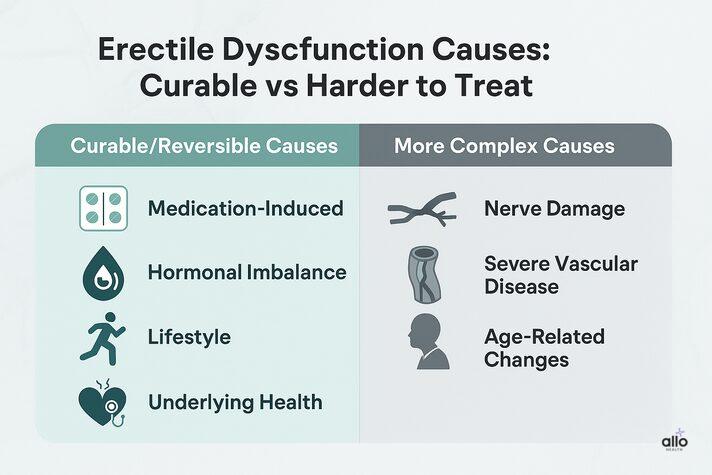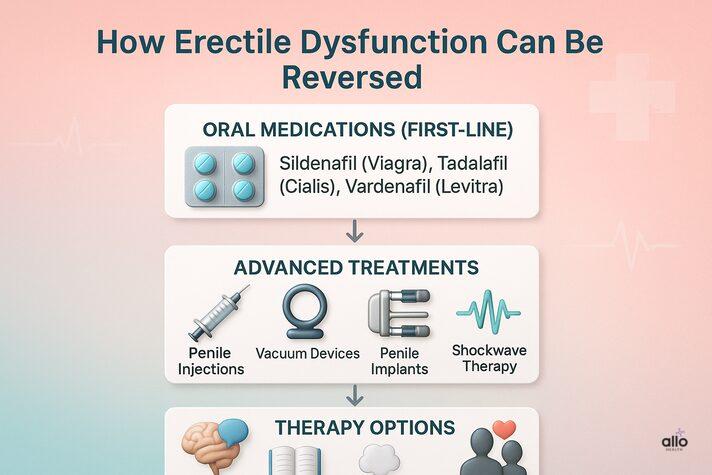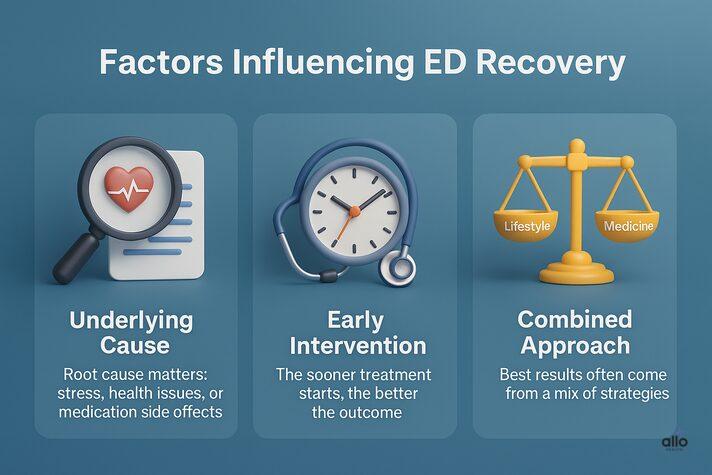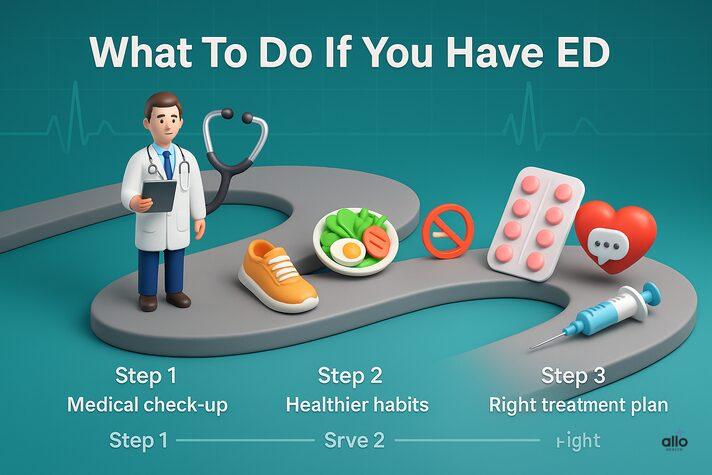Is Erectile Dysfunction Reversible or Curable? Causes, Recovery, and Best Methods to Cure

Erectile dysfunction, or impotence, is often treatable and in many cases even reversible, especially when the underlying cause is identified early. Temporary triggers like stress, lifestyle habits, or certain medications usually respond well to treatment, while more complex causes like severe vascular disease or nerve damage may be harder to fully cure. Studies show about 29% of men achieve complete recovery within five years, while treatments like oral medications have 70-80% success rates. Modern options such as medications, therapy, devices, and even surgery provide reliable solutions for most men.
Can impotence be cured? That’s often the first question men ask when they notice problems with erections. The short answer is yes, in most cases, erectile dysfunction (ED) is treatable and sometimes even fully reversible. Whether it goes away on its own or needs medical help depends on the underlying cause.
In this article, we’ll break down which types of ED are curable, which may need long-term management, and the treatments that can help.
Can Impotence Be Cured?
Yes, impotence, or as it’s medically known, erectile dysfunction (ED), can often be cured or at least significantly improved, especially when the underlying cause is identified and treated.
But many people still wonder: Is erectile dysfunction curable or not? The truth is, the chances of a complete cure depend on what’s causing the ED in the first place. For example, according to a study[1] published in the Journal of Sexual Medicine, about 29% of men experienced complete recovery after five years of treatment.
In many cases, erectile dysfunction symptoms can be reversed with the right treatment. But in some situations, it can be more challenging and in rare cases, even impossible to fully cure.
According to Allo Health, nearly 1 in 2 men experience erectile dysfunction, which is based on our internal clinical data of more than 2.5 lakh patients who have visited our clinics.
Let’s find out when erectile dysfunction is curable and when it is not.

Erectile Dysfunction Causes: Curable vs Harder to Treat
Erectile dysfunction is caused by several different causes, and sometimes it is a mix of different causes. While some of these causes are reversible, others are more complicated.
Potentially Curable/Reversible Causes of Erectile Dysfunction
1. Medication-Induced ED
Certain medications can interfere with sexual function, such as high blood pressure medicines, antidepressants, antihistamines, and painkillers like opioids.
In many cases, once the culprit medication is identified and discontinued (or switched to an alternative under a doctor’s guidance), erectile function often returns to normal.[2]
2. Hormonal Imbalance
Low testosterone levels are linked with ED, affecting about 1.7% to 35% of men[3]. Testosterone replacement therapy (TRT) can significantly improve erectile function in men with testosterone deficiency.
Research[4] shows that 36% to 42% of patients report improvement in ED after testosterone treatment.
3. Lifestyle-Related ED
Several unhealthy lifestyle habits can cause ED, which can be reversed by making lifestyle adjustments[5]. These lifestyle factors include:
- Obesity and poor diet
- Smoking and excessive alcohol consumption
- Sleep disorders
- Physical inactivity
4. Psychological Factors
Stress, anxiety (including performance anxiety), and depression can all trigger erectile dysfunction. The encouraging part is that these causes are highly treatable.[6]
Counseling or sex therapy often helps individuals and sometimes couples work through these challenges, improving both sexual health and overall intimacy.
5. Underlying Health Conditions
ED is often a symptom of other health conditions. Treating these issues not only benefits overall health but can also reverse erectile problems. Key conditions include:
- Diabetes
- Heart Disease
- High blood pressure
- Obstructive sleep apnea
More Persistent and Complex Causes of ED
Some causes of ED can result in lasting damage, making it much harder and sometimes impossible to reverse fully. These are:
1. Nerve Damage:
Nerve damage due to conditions like diabetes, surgery, or injury can lead to irreversible ED.
2. Severe Vascular Disease:
Long-standing blood vessel damage, such as advanced atherosclerosis (blood vessel stiffening and blockage), may permanently impair blood flow to the penis, limiting recovery.
3. Age-Related Changes
Age-related changes in erectile function are highly treatable, but age-related ED may not be completely reversible.
The earlier you talk to a doctor about ED, the better the outcome. Most men who seek help find that their condition is reversible or very manageable.

Treatment Options: How Erectile Dysfunction Can Be Reversed
Modern treatments for erectile dysfunction have shown remarkable success rates. Even in situations where ED cannot be completely cured or reversed, these treatments can still provide significant support, reduce symptoms, and allow for a more satisfying sexual experience.
Oral Medications
The first-line treatment for ED is usually oral ED medications known as PDE5 inhibitors. These include:
- Sildenafil (Viagra)
- Tadalafil (Cialis)
- Vardenafil (Levitra)
These medicines work by improving blood flow to the penis during sexual stimulation. They have a success rate of about 70–80%, even in cases where ED isn’t fully reversible[7]. They are also generally safe and well-tolerated under medical supervision.
Advanced Treatments
Penile Injections
Medications such as alprostadil can be given as an injection directly into the penis or as a urethral suppository. These penile injections have a high success rate[8] and can often be self-administered with proper medical guidance.
Vacuum Erection Devices
Also known as erection pumps, these devices are safe and effective, with a success rate of around 50-60%.[9] They work by creating a vacuum that pulls blood into the penis, helping to achieve an erection.
Penile Implants
For men who do not respond to other treatments, penile implants (prostheses) are an excellent option, with success rates as high as 90-95%.[10] These are surgically placed devices that allow for reliable erections.
Shockwave Therapy
An emerging non-invasive procedure, shockwave therapy uses low-intensity sound waves to stimulate new blood vessel growth in the penis, potentially improving erectile function over time.
Therapy
- Sex therapy: Helps address emotional or psychological concerns around sex and erections.
- Cognitive Behavioral Therapy (CBT): A structured approach to explore and reframe negative thoughts, behaviors, and feelings that contribute to ED.
- Couples therapy: Useful when relationship dynamics are affecting sexual performance and intimacy.

Is Erectile Dysfunction Curable or Not?
Erectile dysfunction can often be curable or at least reversible, especially with timely intervention and depending on the underlying cause. Having ED is not a life sentence, and in many cases, it’s possible to restore normal sexual function.[11]
Factors Influencing ED Recovery
Underlying Cause
ED is frequently reversible if the root cause, such as stress, a treatable medical condition, or a medication side effect, is identified and addressed.
Early Intervention
The sooner ED is diagnosed and treated, the higher the chances of long-term recovery and even permanent resolution.
Combined Approach
For many men, the best results come from a mix of treatments, lifestyle changes, counseling, and medical therapy working together to restore healthy erectile function.

What To Do If You Have ED
Now we know ED is reversible and can be permanently cured in most cases with timely intervention and the right treatment. The most important step is not to feel embarrassed; instead, seek medical help early.
Get a Full Evaluation:
Your doctor may perform a physical exam and order blood or urine tests to check for underlying conditions such as diabetes, high blood pressure, or heart disease.
Make Lifestyle Changes:
Doctors often recommend lifestyle modifications as a first step: regular exercise, a balanced diet, good sleep habits, and quitting smoking or limiting alcohol.
Explore Treatment Options:
Depending on the diagnosis, you and your doctor can decide on the most suitable treatment plan. This may involve counseling or therapy, medications, or advanced treatment approaches like injections or devices.
Key Takeaway: Does Erectile Dysfunction Go Away on Its Own?
In short, does erectile dysfunction go away? Often it does, especially with the right treatment plan and early intervention, but not on its own. Even if a complete cure isn’t possible, you are far from helpless with today’s medical and psychological support; most men find lasting solutions.
The key is identifying the underlying cause and implementing appropriate treatment strategies under the guidance of a medical professional.
"The following blog article provides general information and insights on various topics. However, it is important to note that the information presented is not intended as professional advice in any specific field or area. The content of this blog is for general educational and informational purposes only.
Book consultation
The content should not be interpreted as endorsement, recommendation, or guarantee of any product, service, or information mentioned. Readers are solely responsible for the decisions and actions they take based on the information provided in this blog. It is essential to exercise individual judgment, critical thinking, and personal responsibility when applying or implementing any information or suggestions discussed in the blog."






